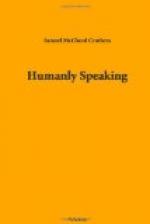A part of the confusion of the traveler comes from the fact that the Roman city and the Roman world are not clearly distinguished one from the other. The New Testament writer distinguishes between Jerusalem as a geographical fact and Jerusalem as a spiritual ideal. There has been, he says, a Jerusalem that belongs to the Jews, but there is also Jerusalem which belongs to humanity, which is free, which is “the mother of us all.”
So there has been a local Rome with its local history. And there has been the greater Rome that has impressed itself on the imagination of the world. Since the destruction of Carthage the meaning of the word “Roman” has been largely allegorical. It has stood for the successive ideas of earthly power and spiritual authority.
Rome absorbed the glory of deeds done elsewhere. Battles were fought in far-off Asia and Africa. But the battlefield did not become the historic spot. The victor must bring his captives to Rome for his triumph. Here the pomp of war could be seen, on a carefully arranged stage, and before admiring thousands. It was the triumph rather than the battle that was remembered. All the interest culminated at this dramatic moment. Rome thus became, not the place where history was made, but the place where it was celebrated. Here the trumpets of fame perpetually sounded.
This process continued after the Empire of the Caesars passed away. The continuity of Roman history has been psychological. Humanity has “held a thought.” Rome became a fixed idea. It exerted an hypnotic influence over the barbarians who had overcome all else. The Holy Roman Empire was a creation of the Germanic imagination, and yet it was a real power. Many a hard-headed Teutonic monarch crossed the Alps at the head of his army to demand a higher sanction for his own rule of force. When he got himself crowned in the turbulent city on the Tiber he felt that something very important had happened. Just how important it was he did not fully realize till he was back among his own people and saw how much impressed they were by his new dignities.
Hans Christian Andersen begins one of his stories with the assertion, “You must know that the Emperor of China is a Chinaman and that all whom he has about him are Chinamen also.” The assertion is so logical in form that we are inclined to accept it without question. Then we remember that in Hans Christian Andersen’s day, and for a long time before, the Emperor of China was not a Chinaman and the great grievance was that Chinamen were the very people he would not have about him.
When we speak of the Roman Catholic Church, we jump at the conclusion that it is the church of the Romans and that the people of Rome have had the most to do with its extension. This theory has nothing to recommend it but its extreme verbal simplicity. As a matter of fact, Rome has never been noted for its pious zeal. Such warmth as it has had has been imparted to it by the faithful who have been drawn from other lands; as, according to some theorists, the sun’s heat is kept up by a continuous shower of meteors falling into it.




